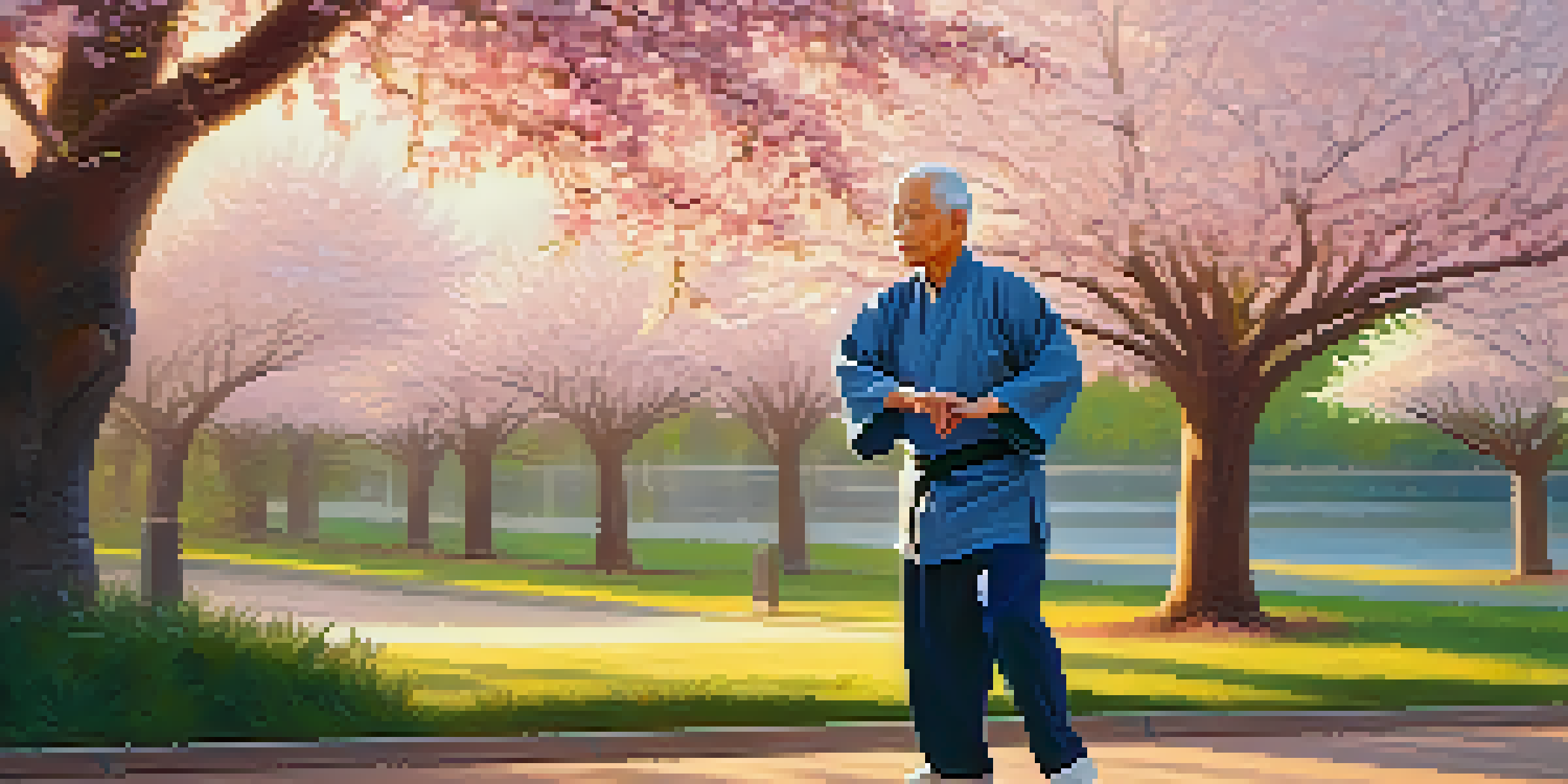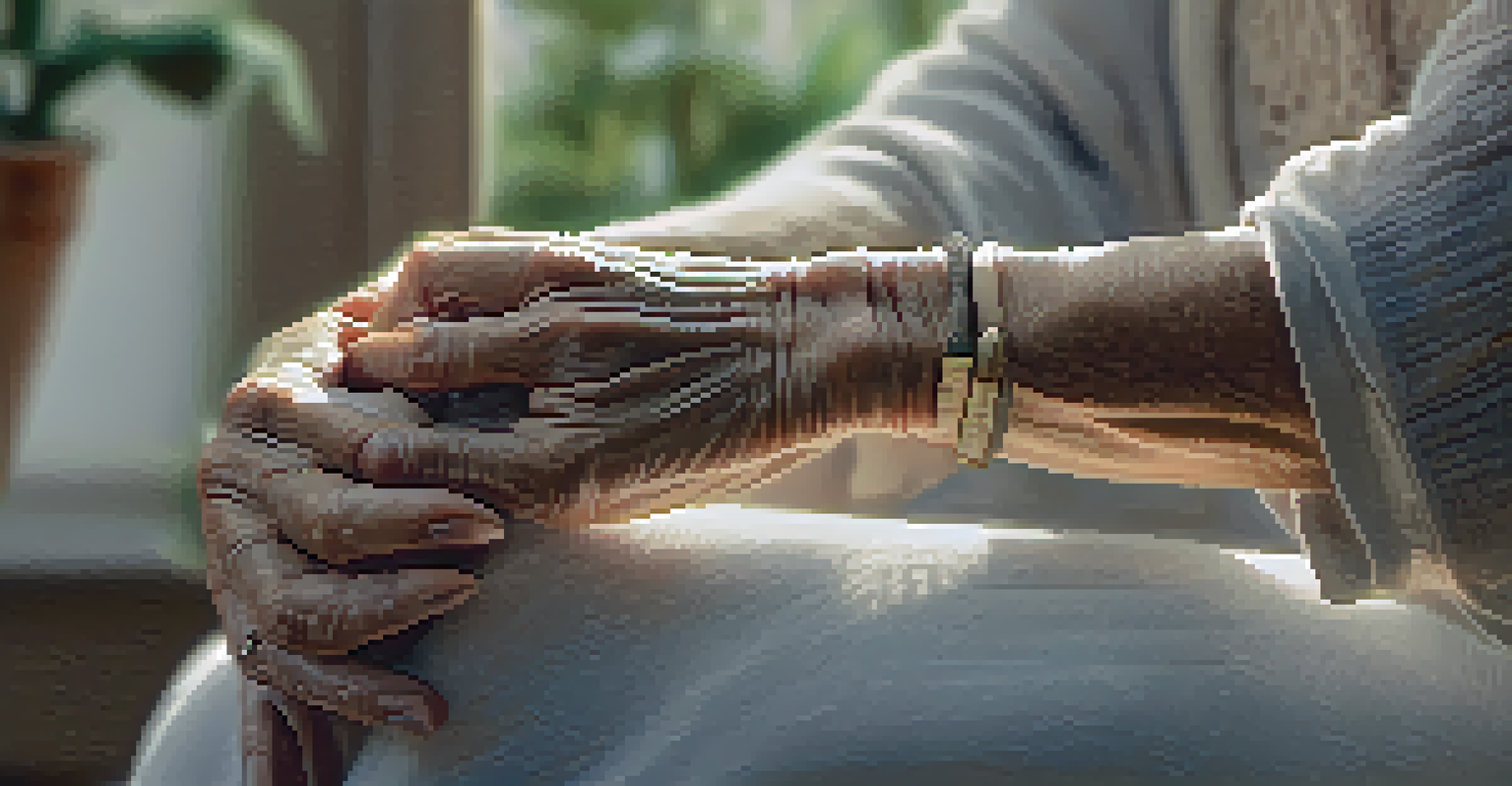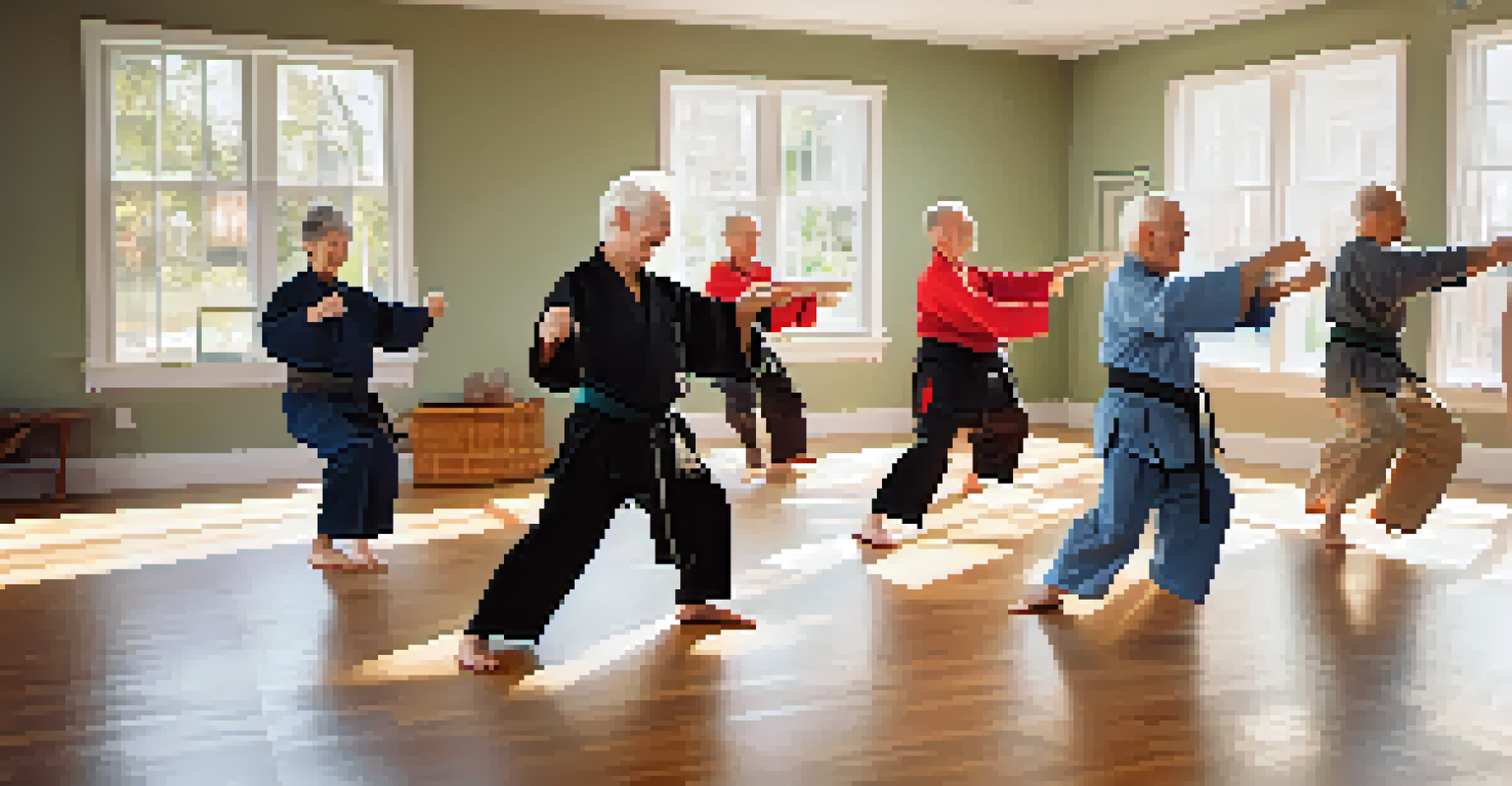Mindfulness and Breathing in Martial Arts for Seniors

Understanding Mindfulness and Its Benefits
Mindfulness is the practice of being fully present in the moment, observing thoughts and feelings without judgment. For seniors, this can lead to reduced anxiety and enhanced emotional well-being. Imagine sitting quietly, focusing on your breath, and letting the world fade away; this simple act can create a profound sense of peace.
Mindfulness isn't difficult. What's difficult is to remember to be mindful.
Engaging in mindfulness helps seniors cultivate awareness, which can improve their martial arts practice and daily life. By focusing on movements and breath, they can enhance their coordination and balance, making every step feel more intentional. It's like turning down the noise of life and tuning into a clearer, more harmonious frequency.
Moreover, mindfulness encourages seniors to listen to their bodies, promoting better self-care. This awareness can help them avoid injuries during practice while allowing them to enjoy their training sessions more fully. In essence, mindfulness becomes a guiding light that illuminates the path to a healthier lifestyle.
The Role of Breathing in Martial Arts
Breathing is a fundamental aspect of martial arts, acting as both a tool for focus and a means of energy management. Inhale deeply and exhale fully; this simple rhythm aids in maintaining stamina during practice. For seniors, mastering breath control can enhance their performance while ensuring they remain calm and centered.

When practicing martial arts, proper breathing techniques can help seniors manage stress and anxiety. Imagine facing a challenging move; a few deep breaths can transform that tension into focus, allowing for a smoother execution. This technique is not just beneficial in martial arts but can be applied to everyday situations, such as public speaking or family gatherings.
Mindfulness Reduces Anxiety
Practicing mindfulness helps seniors stay present, leading to reduced anxiety and enhanced emotional well-being.
Additionally, breath control fosters relaxation, allowing seniors to engage more fully in their practice. By integrating breathing exercises into their routine, they can build a stronger connection between mind and body. This connection paves the way for a more enjoyable and fulfilling martial arts experience.
Mindfulness Practices for Seniors in Martial Arts
Incorporating mindfulness into martial arts can be as simple as dedicating a few moments before practice to center oneself. Seniors can take this time to reflect, breathe, and visualize their goals. This warm-up ritual transforms the practice into a more meaningful experience, setting a positive tone for the session ahead.
Breath is the bridge which connects life to consciousness, which unites your body to your thoughts.
Another effective practice involves focusing on each movement as it happens. Instead of rushing through a sequence, seniors can slow down and engage fully with each action. Think of it as savoring a delicious meal; every bite is an opportunity to enjoy the flavors. This approach not only improves technique but also enhances enjoyment.
Lastly, practicing gratitude during martial arts can deepen the experience. Seniors can take a moment to appreciate their bodies, the skills they've acquired, and the community around them. This gratitude fosters a positive mindset that encourages growth and resilience, making each session a celebration of progress.
Breathing Techniques for Enhanced Performance
One effective breathing technique is the '4-7-8' method, which involves inhaling for four counts, holding for seven, and exhaling for eight. This practice can calm the nervous system and prepare seniors for their training. It’s like resetting a computer; a brief pause can enhance performance significantly.
Another useful technique is diaphragmatic breathing, which allows for deeper breaths and more oxygen intake. Seniors can place a hand on their belly to feel the rise and fall, ensuring they engage their diaphragm. This method not only boosts energy levels but also promotes relaxation and focus, essential components in martial arts.
Breathing Enhances Performance
Effective breathing techniques enable seniors to manage energy and focus, improving their martial arts practice.
Lastly, pairing breathing techniques with movement can amplify their benefits. Seniors might practice slow, deliberate punches or kicks while synchronizing their breaths with each action. This coordination not only enhances their martial arts skills but also creates a meditative state, where mind and body work in harmony.
Building Community Through Mindful Martial Arts
Martial arts classes for seniors can foster a strong sense of community, where mindfulness and breathing practices are shared among peers. This collective experience encourages camaraderie, making each session more enjoyable. The laughter and support in the room create a welcoming atmosphere for everyone involved.
As seniors practice together, they can share their mindfulness journeys, learning from each other's experiences. This exchange can be incredibly enriching, as individuals discover diverse techniques and perspectives. Just like a potluck dinner, everyone brings something unique to the table, enhancing the overall experience.
Moreover, a community-centered approach to martial arts can motivate seniors to remain committed to their practice. Knowing that others are on a similar journey fosters accountability and encouragement. Together, they can celebrate milestones, big or small, creating an uplifting environment that inspires continued growth.
Overcoming Challenges with Mindfulness and Breathing
Seniors may face various challenges when practicing martial arts, be it physical limitations or mental blocks. Mindfulness can be a powerful tool to navigate these hurdles, allowing individuals to approach obstacles with patience and compassion. Instead of feeling defeated, they can learn to embrace challenges as opportunities for growth.
Breathing techniques can also provide instant relief during moments of frustration or anxiety. A few deep breaths can help refocus the mind and regain control over emotions. It’s akin to pulling over during a long drive to refresh and recharge before continuing on the journey.
Community Strengthens Practice
Engaging in mindful martial arts classes fosters a sense of community, encouraging support and shared growth among seniors.
Additionally, by practicing mindfulness, seniors can develop a more positive mindset, viewing setbacks as part of the learning process. This perspective shift not only enhances their martial arts journey but also enriches their daily lives. With each challenge faced, they become more resilient, ultimately leading to greater confidence.
The Lasting Impact of Mindfulness in Martial Arts
Practicing mindfulness and breathing in martial arts can have long-lasting benefits for seniors. These practices can lead to improved mental clarity, emotional balance, and physical well-being. As they continue to engage in these techniques, the positive effects can spill over into other areas of their lives, creating a holistic sense of wellness.
Moreover, the skills developed through mindfulness and breathing can enhance relationships with family and friends. As seniors become more present and attentive, they can foster deeper connections with loved ones. It’s like planting seeds in a garden; with time and care, those seeds grow into beautiful blossoms.

Ultimately, the journey of integrating mindfulness into martial arts is a rewarding one. It empowers seniors to take charge of their health and well-being, inspiring them to live life more fully. As they embrace this path, they not only become better martial artists but also cultivate a richer, more meaningful existence.